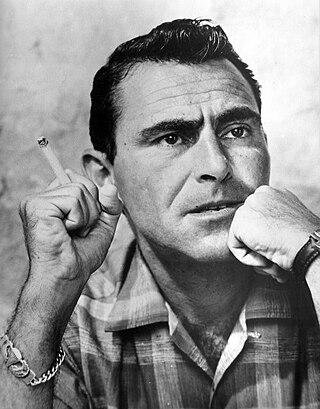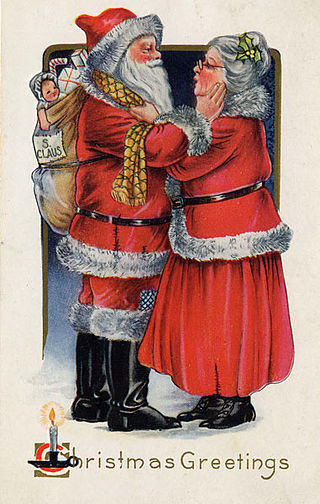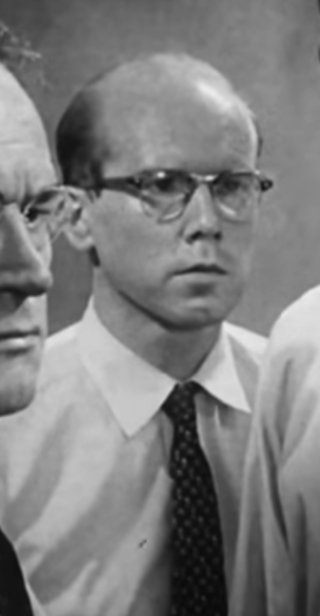Related Research Articles

The Twilight Zone is an American media franchise based on the anthology television series created by Rod Serling in which characters find themselves dealing with often disturbing or unusual events, an experience described as entering "the Twilight Zone". The episodes are in various genres, including fantasy, science fiction, absurdism, dystopian fiction, suspense, horror, supernatural drama, black comedy, and psychological thriller, frequently concluding with a macabre or unexpected twist, and usually with a moral. A popular and critical success, it introduced many Americans to common science fiction and fantasy tropes. The first series, shot entirely in black-and-white, ran on CBS for five seasons from 1959 to 1964.

Rodman Edward Serling was an American screenwriter and television producer best known for his live television dramas of the 1950s and his anthology television series The Twilight Zone. Serling was active in politics, both on and off the screen, and helped form television industry standards. He was known as the "angry young man" of Hollywood, clashing with television executives and sponsors over a wide range of issues, including censorship, racism, and war.

The Santa Clause is a 1994 American Christmas comedy film directed by John Pasquin and written by Leo Benvenuti and Steve Rudnick. The first installment in The Santa Clause franchise, it stars Tim Allen as Scott Calvin, an ordinary man who accidentally causes Santa Claus to fall from his roof to his supposed death on Christmas Eve. When he and his young son, Charlie, finish the late St. Nick's trip and deliveries, they go to the North Pole where Scott learns that he must become the new Santa and convince those he loves that he is indeed Santa Claus.

"The Big Tall Wish" is episode twenty-seven of the American television anthology series The Twilight Zone, with an original score by Jerry Goldsmith. It originally aired on April 8, 1960, on CBS. This was one of a few Twilight Zone episodes to feature black actors in lead roles, a rarity for American television of the era.

"Twenty Two" is episode 53 of the American television series The Twilight Zone. The story was adapted by Rod Serling from a short anecdote in the 1944 Bennett Cerf Random House anthology Famous Ghost Stories, which itself was an adaptation of "The Bus-Conductor", a short story by E. F. Benson published in The Pall Mall Magazine in 1906. It was one of the six episodes of the second season which were shot on videotape in a short-lived experiment aimed to cut costs, and was directed by Jack Smight.
"It's a Good Life" is the eighth episode of the third season of the American television series The Twilight Zone, and the 73rd overall. It was written by series creator/showrunner Rod Serling, based on the 1953 short story "It's a Good Life" by Jerome Bixby. The episode was directed by James Sheldon, and is considered by some, such as Time and TV Guide, to be one of the best episodes of the series. It originally aired on November 3, 1961. The episode was one of four from the original 1959 series which formed the basis of the 1983 film Twilight Zone: The Movie.
Richard Mulligan was an American character actor known for his roles in the sitcoms Soap (1977–1981) and Empty Nest (1988–1995). Mulligan was the winner of two Emmy Awards and one Golden Globe Award (1989). Mulligan was the younger brother of film director Robert Mulligan.

Mrs. Claus is the legendary wife of Santa Claus, the Christmas gift-bringer in Western Christmas tradition.

"The Bard" is an episode of the American television anthology series The Twilight Zone. It was the final episode of The Twilight Zone to be one hour long. A direct satire of the American television industry, the episode features a parody of Marlon Brando by Burt Reynolds, and concerns an inept screenwriter, who through the use of black magic, employs William Shakespeare as his ghostwriter.

The Twilight Zone is an anthology television series which aired from September 27, 1985, to April 15, 1989. It is the first of three revivals of Rod Serling's acclaimed 1959–64 television series, and like the original it featured a variety of speculative fiction, commonly containing characters from a seemingly normal world stumbling into paranormal circumstances. Unlike the original, however, most episodes contained multiple self-contained stories instead of just one. The voice-over narrations were still present, but were not a regular feature as they were in the original series; some episodes had only an opening narration, some had only a closing narration, and some had no narration at all. The multi-segment format liberated the series from the usual time constraints of episodic television, allowing stories ranging in length from 8-minutes to 40-minute mini-movies. The series ran for two seasons on CBS before producing a final season for syndication.

The Twilight Zone is an American fantasy science fiction horror anthology television series created and presented by Rod Serling, which ran for five seasons on CBS from October 2, 1959, to June 19, 1964. Each episode presents a standalone story in which characters find themselves dealing with often disturbing or unusual events, an experience described as entering "the Twilight Zone", often with a surprise ending and a moral. Although often considered predominantly science-fiction, the show's paranormal and Kafkaesque events leaned the show much closer to fantasy and horror. The phrase "twilight zone", inspired by the series, is used to describe surreal experiences.

John Donald Fiedler was an American actor. His career lasted more than 55 years in stage, film, television, and radio. Fiedler's high, flutey voice was instantly recognizable. He was typecast beginning early in his career for delicate, quiet, nerdy characters, although he also played sneaky villains. His roles included the meek Juror #2 in 12 Angry Men (1957); the benign-seeming gentleman who tries to prevent the Younger family from moving into a whites-only neighbourhood in A Raisin in the Sun (1961); the voice of Piglet in Disney's Winnie the Pooh productions; Vinnie, one of Oscar's poker cronies, in the film The Odd Couple (1968); and Emil Peterson, the hen-pecked milquetoast husband on The Bob Newhart Show.

Burton Hill Mustin was an American character actor who appeared in over 150 film and television productions. He also worked in radio and appeared on the stage.
Motion pictures featuring Santa Claus constitute their own subgenre of the Christmas film genre. Early films of Santa revolve around similar simple plots of Santa's Christmas Eve visit to children. In 1897, in a short film called Santa Claus Filling Stockings, Santa Claus is simply filling stockings from his pack of toys. Another film called Santa Claus and the Children was made in 1898. A year later, a film directed by George Albert Smith titled Santa Claus was created. In this picture, Santa Claus enters the room from the fireplace and proceeds to trim the tree. He then fills the stockings that were previously hung on the mantle by the children. After walking backward and surveying his work, he suddenly darts at the fireplace and disappears up the chimney.
The Secret World of Santa Claus is a French and Canadian children's animated television show. It is syndicated to several countries worldwide, including Teletoon in Canada, and Super RTL in Germany, and is generally seen every December during the holiday season. On December 25, 1999, Christmas Day, The Secret World of Santa Claus marathon took place from 6:00am to 7:00pm. As of 2013, it has been released on 2 DVDs from Cinedigm in the US.

A Flintstone Christmas is a 1977 animated Christmas television special featuring characters from The Flintstones franchise. It was produced by Hanna-Barbera and is the second Christmas-themed animated work in the franchise, after the 1964 episode "Christmas Flintstone." Both feature the character Fred Flintstone taking on the role of Santa Claus. The special first aired on NBC on December 7, 1977.
Hoops & Yoyo Ruin Christmas is an American animated 2011 Christmas TV special that aired on CBS on November 25, 2011. The special was based on the Hallmark Cards characters Hoops & Yoyo.

The Christmas Chronicles is a 2018 American Christmas comedy film directed by Clay Kaytis from a screenplay by Matt Lieberman. The film stars Kurt Russell, Judah Lewis, Darby Camp, Lamorne Morris, Kimberly Williams-Paisley, and Oliver Hudson. It is the first installment in The Christmas Chronicles film series. The film was produced by 1492 Pictures and Wonder Worldwide and was released on November 22, 2018, on Netflix.

Alien Xmas is a 2020 American stop-motion animated Christmas film directed by Stephen Chiodo. Based on the 2006 book of the same name by Chiodo and Jim Strain, the film features the voices of Keythe Farley, Dee Bradley Baker, Kaliayh Rhambo, Michelle Deco, and Barbara Goodson. The film's plot centers on X, an extraterrestrial belonging to a race of thieving aliens known as Klepts, who is sent to the North Pole on a mission to eliminate Earth's gravity.
References
- 1 2 Zicree, Marc Scott. "The Twilight Zone Companion Silman-James Press; 2 edition (December 1992)". Archived from the original on March 23, 2016. ISBN 978-1879505094